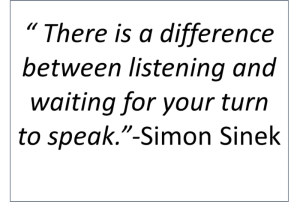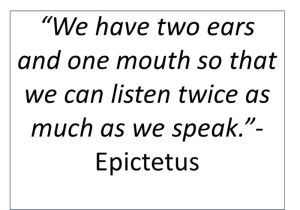“He takes out his cell phone during every meal together.”
“She never looks me in the eye.”
“Did they say 2:00 or 3:00? I wasn’t listening…”
Do any of these situations sound familiar…either you’ve experienced them or are guilty of them? (Be honest, now!)
For many years I was a member of Toastmasters, an organization dedicated to helping people become better communicators. One of the skills we worked on regularly was improving our listening. While a student of improving my OWN listening, I taught workshops on Effective Listening in businesses, schools and at Toastmaster events. Over time I learned a LOT about being a good listener. It takes work, practice and a desire to improve.
If you, too, want to become a better listener, read on. We’ll look at practical steps to improve your listening skills and make you a better communicator.
1. Decide
You may be familiar with this axiom: Nothing happens until you decide. Whether it’s to lose 20 pounds, save money to buy a house, run a marathon or get your 3-year old to sleep in her own bed, it won’t just “happen”.
In the decision process, phrasing matters. Not… “I wish I was a better listener” , not.. “I should try to be a better listener”.
I am going to become a better listener.
Whether you want to lose weight, save money, run long distances or change behavior, a plan is a road map to achieving your goal.
Plan specific situations during the next few weeks where you will apply improved listening skills. Choose both one-on-one interactions and times when you listen as a member of a group. Actually schedule as many of these practice times as possible in your calendar. This is your homework for skill building in improved listening.
Examples might be: Chamber Business after Hours-look the person in the eye as they talk and don’t interrupt anyone while they are speaking; Sunday dinner-everyone puts cell phones in a basket in the living room and ask mom/kids some interesting questions; Rotary Meeting-ignore room distractions while the speaker is presenting, mentally outline the speaker’s talk.
As my colleague and mentor, Kent Stoman, often reminds me: What’s important gets scheduled and what gets scheduled gets done.
3. Arm yourself with conversation starters
Develop for yourself some comfortable questions or conversation openers you can ask anyone at any time. Here are some suggestions:
- Tell me about: your family, what you do for a living, what you do when you aren’t working, your week, your day at school etc.
- What is the most significant thing that has happened to you this year?
- What is your connection to: this event/organization, the bride and groom, etc.?
- What do you remember most about your childhood?
- What do you like most about the work you do?
Practice your questions out loud until you are comfortable asking them.
Visit my friend Bob Tiede’s site, leadingwithquestions.com, for more interesting question ideas.
4. Eliminate distracting habits
My 4-year old granddaughter loves to play games on both computer and phone. My daughter, Kimberly, recognizes the allure of “screens” and weekly has screen free days during which both she and Lilly must find other ways to occupy themselves. They listen better on those days.
You know what I’m going to say, don’t you? Putting away your phone/pad/laptop is a first step to better listening.
Here are a few other habits to work on eliminating :
- Interrupting the person speaking
- Finishing peoples’ sentences
- Looking around the room at other people or other distractions
- Body language that turns away from the person speaking
- Thinking about something else while pretending to listen to the person
- Listening only because you want to form your own response
It’s a pleasure to be in the company of a good listener. Not only that, you’ll be considered a great conversationalist by the people around you if you are a good listener. My friend, Bill, has developed a routine that helps him keep silent when he has asked a question and is waiting for a response. He folds his hands together in front of him and presses his lips together. He doesn’t allow his lips to open with another word until the other person has responded. Bill has used this habit with great success when asking donors about their giving (and, I’ll bet his wife, Sue, appreciates his attention, too!)
What new habits can you cultivate to improve your listening skills?
- Be comfortable with silence
- Look the speaker in the eye
- Use open body language: lean forward, nod in agreement, don’t cross your arms etc.
- Concentrate on what the person is saying
- Listen for feelings, not just words
- Ignore internal judgments about the speaker’s appearance or delivery and focus on the message
- Use the time between the speed of speech and the speed of thought to reinforce for yourself what the speaker is saying
These are just a few tips to improve your listening skills. Expect it to take some work. Deciding is the first step, but once you have a plan and work that plan, you will see the fruits of your efforts.
You might even learn a thing or two…
Your friend,






 [caldera_form id="CF591c6f3f5221c"]
[caldera_form id="CF591c6f3f5221c"]

